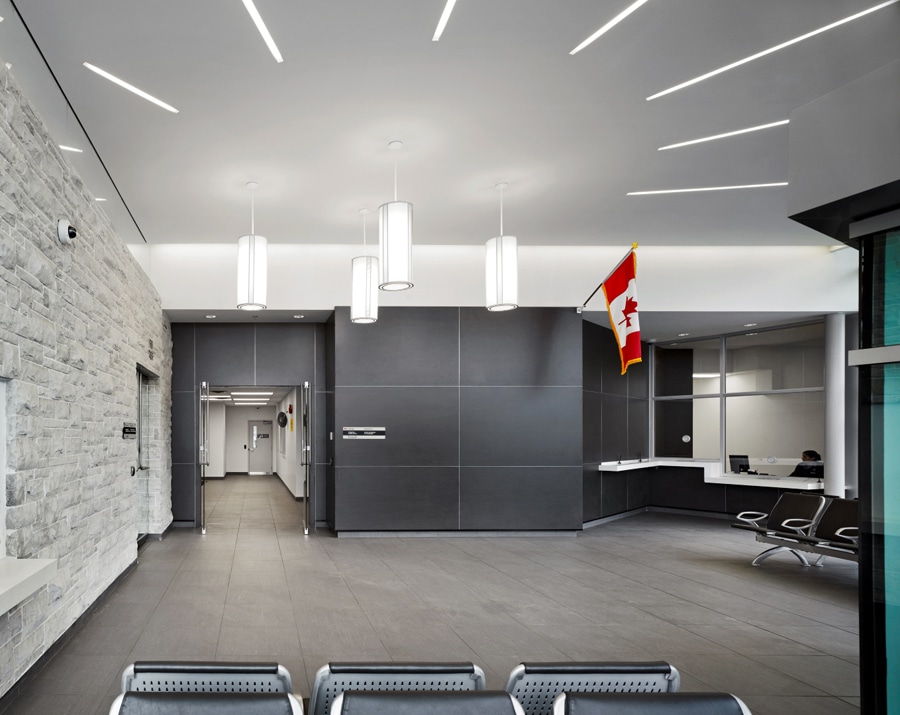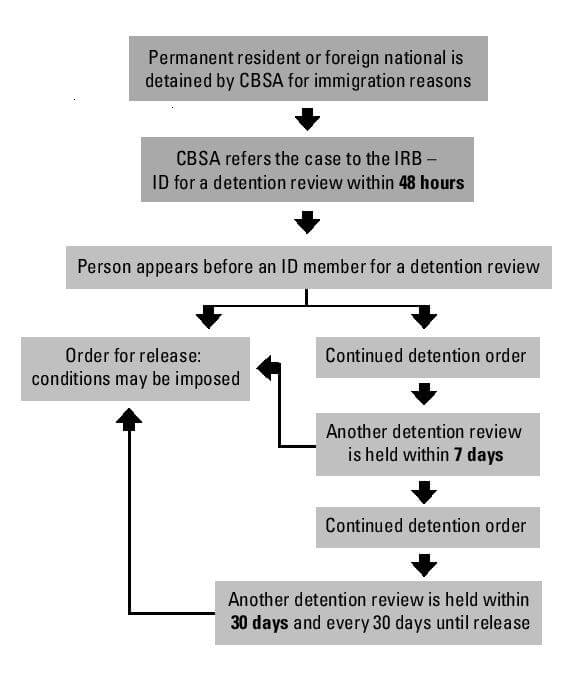
Detention
The law under which an individual is detained by Canada’s Border Services Agency, is mentioned at section 55 of the Immigration and Refugee Protection Act, where it states that an officer:
- considered it necessary to complete an examination;
- was not satisfied with the person’s identity;
- had reason to believe that a person was inadmissible to Canada and was a danger to the public, unlikely to appear for an examination, an admissibility hearing, removal from Canada or a proceeding that could lead to a removal order; or
- had reason to suspect that the person was inadmissible to Canada for reasons of security, violating human or International rights, serious criminality, criminality or organized criminality.
The individual is usually detained either in a provincial correctional facility or in a minimum-security immigration holding centre located in Toronto, Montreal or Vancouver. The Canada’s Border Service Agency will determine where the place of detention would be.
Visiting hours and the number of visitors permitted vary for each facility it is therefore better to directly contact the detention facility by phone or through their website. Visits from counsel or a designated representative will be allowed during the facility’s normal visiting hours. Visits after these hours will be allowed only with the permission of the management of the facility. Their decision will depend on the particular details of your case.
Detention Review Hearing
When is the detention hearing?
As per section 57 (1) of the Immigration and Refugee Protection Act within 48 hours after an individual is taken into detention, the Immigration Division of the Immigration and Refugee Board must review the reasons for the continued detention. Weekends are not counted as days, therefore if you are detained on a Thursday or Friday your hearing will be on Monday or Tuesday.
What are your rights?
- You have the right to be represented by counsel at your expense or to receive legal aid, if you qualify. You will be given the necessary information about the legal aid services available to you. You may also designate a friend or a member of an organization or association to represent you.
- You have the right to be informed of the reason for your detention.
- You have the right to contact your embassy or a representative of your country’s consulate at your request.
- If you do not want a consular representative to be contacted, you can ask that the office of the United Nations High Commissioner for Refugees in Canada be informed of your detention.
- If you do not understand or speak the language in which proceedings (that is, detention reviews, immigration hearings, etc.) are conducted, you have the right to be assisted by an interpreter.
- If you are a minor under the age of 18, or in the opinion of the Immigration Division of the Immigration and Refugee Board (IRB), are unable to understand the nature of the proceedings, a designated representative may be appointed to help guide you through the proceedings.
[/caption]
How is a detention review held?
The Immigration and Refugee Board member will be in charge of your review. You may address them as Madam or Mister Member. The member will start introducing everyone who is present at the hearing and will explain what will happen at the hearing. The Minister’s Counsel will present to the member some facts and evidence that will explain why the Canada’s Border Service Agency believes you should be detained. After her explanation you will be given an opportunity to respond and explain your story as well as ask questions personally or by your counsel if you are represented. The Member might ask you questions throughout the hearing. After hearing from both sides, the Member will decide whether you will be released or remain in detention. The Member will usually state his or her decision and the reasons for this decision at the end of the hearing. The member may also set a date for another hearing to give you the decision and the reasons.
What are the factors the member considers?
The two most common scenarios are that the officer believes the individual is a danger to the public or a flight risk.
If the person is considered a danger to the public, r. 246 of the Immigration and Refugee Protection Regulations states the factors the member must consider:
- the person constitutes, in the opinion of the Minister, a danger to the public in Canada or a danger to the security of Canada;
- association with a criminal organization;
- engagement in people smuggling or trafficking in persons;
- a conviction in Canada for a sexual offence or an offence involving violence or weapons;
- a conviction for an offence in Canada under the Controlled Drugs and Substances Act for trafficking, importing and exporting, and production;
- a conviction outside Canada or pending charges outside Canada for a sexual offence or an offence involving violence or weapons;
- a conviction outside Canada or pending charges outside Canada for trafficking, importing and exporting, and production of controlled substances.
If the person is considered a flight risk, r. 245 of the Immigration and Refugee Protection Regulations states the factors that the member will consider:
- being a fugitive from justice in a foreign jurisdiction in relation to an offence that, if committed in Canada, would constitute an offence under an Act of Parliament;
- voluntary compliance with any previous departure order;
- voluntary compliance with any previously required appearance at an immigration or criminal proceeding;
- previous compliance with any conditions imposed in respect of entry, release or a stay of removal;
- any previous avoidance of examination or escape from custody, or any previous attempt to do so;
- involvement with a people smuggling or trafficking in persons operation that would likely lead the person to not appear for a measure referred to in paragraph 244(a) of the IRPR or to be vulnerable to being influenced or coerced by an organization involved in such an operation to not appear for such a measure;
- the existence of strong ties to a community in Canada.
Outcomes of a hearing
In making a decision, the Member considers the information provided at the detention review – including your version of events, and Canada’s immigration law.
If the Member decides that there is no longer a reason under Canada’s immigration law to keep you in detention the Member will order your release. The Member may also order you to meet certain conditions, such as checking in regularly at a Canada’s Border Services Agency office for a period of time, or paying a cash bond.
If you are ordered to remain in detention, you will have another detention review within seven days. If, after this second review, the Member again orders your detention, the reasons for your detention will be reviewed again in 30 days and every 30 days after that, until you are released or removed from Canada.

You may ask for leave (or permission) of the Federal Court of Canada for judicial review of the decision.
As we have seen above navigating through a detention review hearing process is scary and complicated results vary greatly from Canada Border Services Agency officer to CBSA officer, and there is no sure way of guaranteeing one’s release without the full facts of the case being disclosed, usually during a legal consultation .
To be prepared consult the Toronto immigration lawyers at Chaudhary law Office we can assist you in your or your loved one’s detention review hearing.
For more information:
http://publications.gc.ca/Collection/MQ21-33-2006E.pdf
http://www.cbsa-asfc.gc.ca/publications/pub/bsf5012-eng.pdf
http://www.irb-cisr.gc.ca/Eng/BoaCom/references/pol/GuiDir/Pages/GuideDir02.aspx#note35
